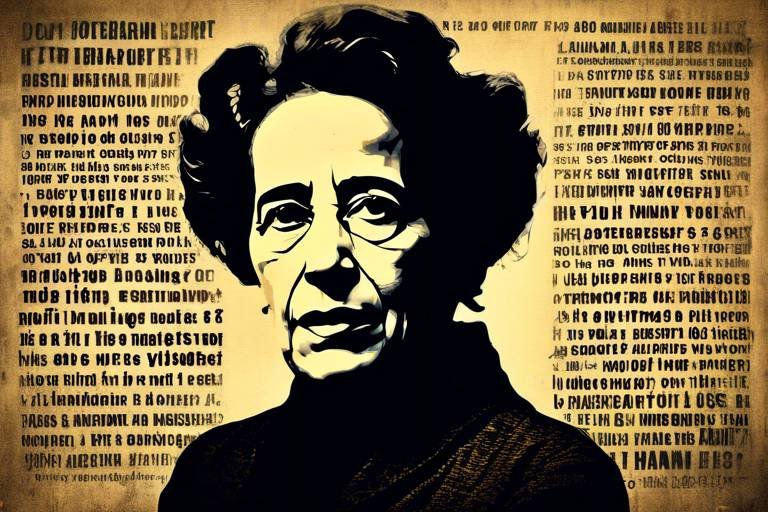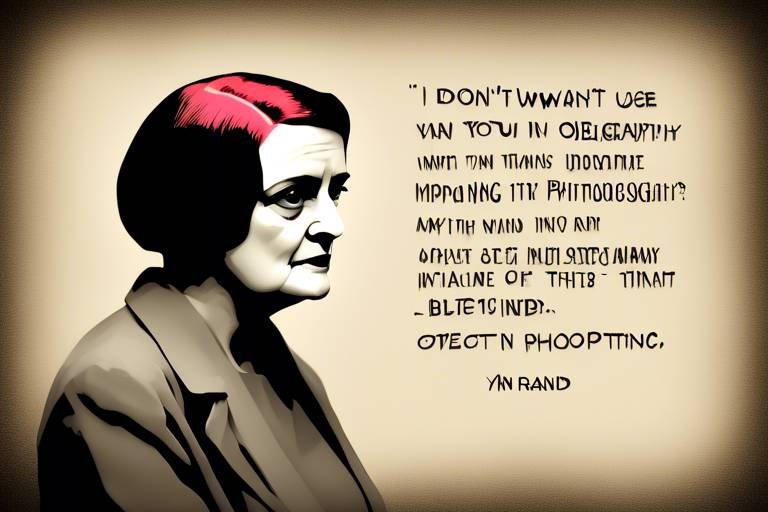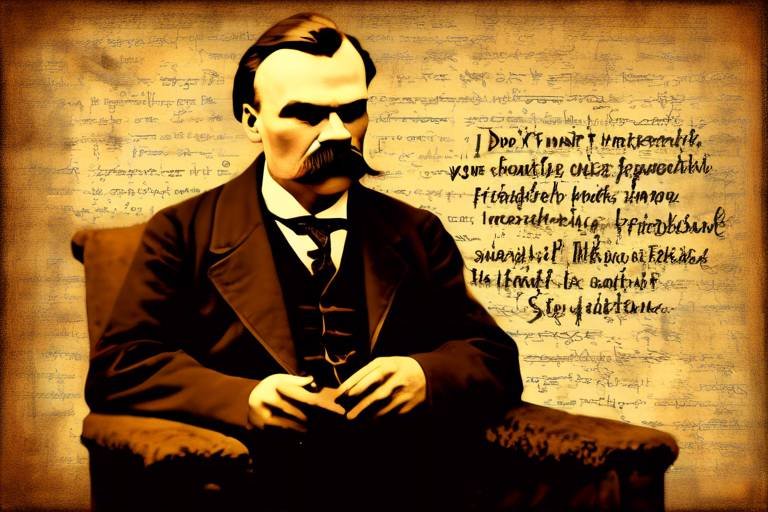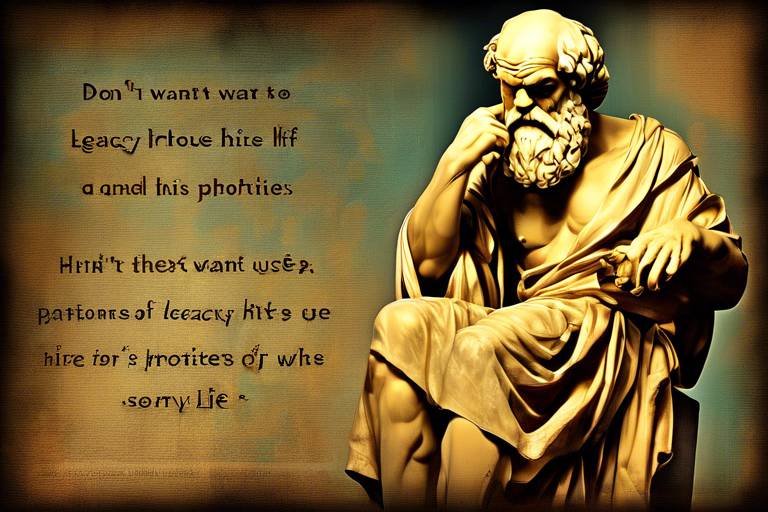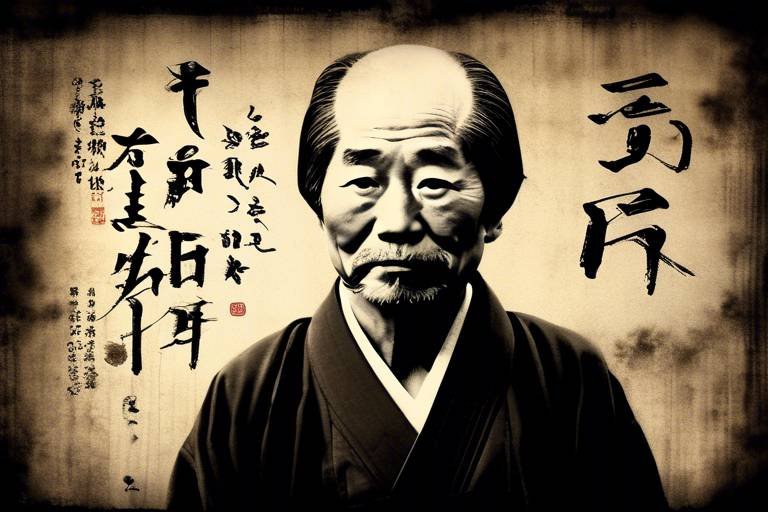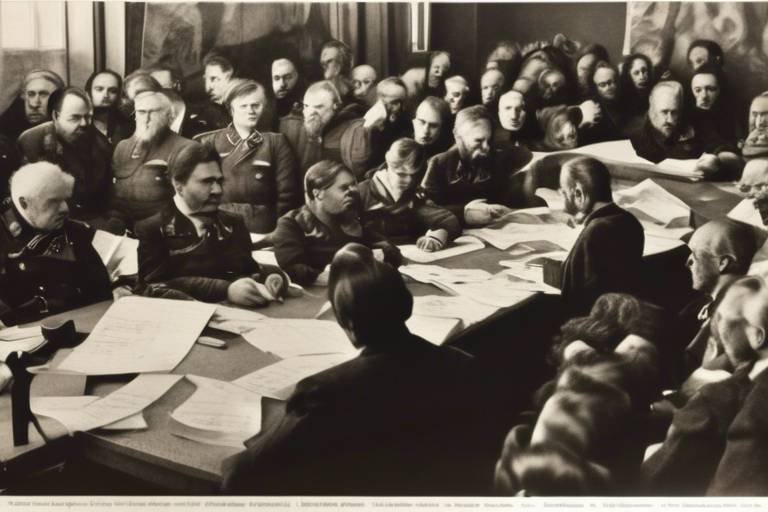Is Hannah Arendt's Philosophy Relevant to Modern Politics?
Hannah Arendt, a profound thinker of the 20th century, delved into the intricacies of power, politics, and the human condition. Her work resonates deeply in today's political landscape, where issues of authoritarianism, civic engagement, and moral responsibility are more pressing than ever. As we navigate through a world rife with political turmoil and societal disconnect, one must ask: how can Arendt's insights illuminate our understanding of contemporary politics? In this exploration, we will uncover the threads that connect her philosophy to modern challenges, revealing a tapestry rich with relevance and urgency.
Arendt's examination of totalitarianism provides a lens through which we can scrutinize the rise of authoritarian movements today. By analyzing how these regimes manipulate truth and suppress dissent, she offers us a toolkit to recognize similar patterns in our own societies. For instance, consider the way misinformation spreads like wildfire in the digital age, akin to how totalitarian states historically controlled narratives. This manipulation of truth not only threatens democratic values but also challenges our ability to engage critically with the world around us.
Moreover, Arendt's distinction between power and violence invites us to rethink our understanding of political authority. She asserts that true power arises from collective action and the consent of the governed, contrasting sharply with the coercive nature of violence. This perspective is essential when we consider the role of citizens in shaping governance today. Are we merely spectators in the political arena, or do we actively participate in the democratic process? Arendt would argue that our engagement is crucial; without it, we risk losing the very essence of our democratic institutions.
At the heart of Arendt's philosophy lies the concept of the public sphere, which she champions as vital for a thriving democracy. She believed that a vibrant public discourse fosters political engagement and accountability, especially in our increasingly fragmented societies. In today's world, where social media often serves as both a platform for dialogue and a battleground for misinformation, the challenge becomes clear: how do we cultivate a space for constructive conversation? Arendt's work encourages us to reclaim the public sphere, ensuring it remains a place for diverse voices and critical debate.
Arendt also emphasizes the necessity of active citizen participation in politics. She warns that apathy can lead to the erosion of democratic values and institutions. This resonates profoundly in an era where voter turnout can be dismally low, and civic engagement often feels like an uphill battle. We must ask ourselves: what are we doing to foster a culture of participation? Are we merely complaining about the state of affairs, or are we rolling up our sleeves to make a difference?
Furthermore, Arendt's notion of political responsibility challenges us to engage thoughtfully with political issues. It urges individuals to consider the consequences of their actions within the public realm. In a world where decisions are often made in haste and without sufficient reflection, her call for moral judgment becomes increasingly relevant. Are we, as citizens, taking the time to understand the implications of our choices? Arendt's philosophy serves as a reminder that our political actions carry weight and that we must be mindful of their impact on society.
One of Arendt's most provocative concepts is the banality of evil, which serves as a cautionary tale in modern politics. This idea compels us to reflect on the complicity of ordinary individuals in systemic injustices. It prompts us to question our own roles in perpetuating harmful systems. In an age where social injustices are rampant, Arendt's insights urge us to confront uncomfortable truths about our participation, or lack thereof, in the political process.
As we delve deeper into Arendt's views on ethics and morality in politics, we uncover the moral dimensions of political decision-making. She highlights the challenges of maintaining integrity in the face of power, reminding us that ethical considerations should never be sidelined in political discourse. The dangers of conformity, which she warns against, become starkly apparent in a world where dissent is often stifled. Critical thinking and dissent are not just vital; they are necessary for a healthy political landscape.
In conclusion, Hannah Arendt's philosophical contributions remain profoundly relevant in today's political climate. Her insights on totalitarianism, the nature of power, and the importance of civic engagement provide a roadmap for navigating the complexities of modern political life. As we strive for a more engaged citizenry, her legacy prompts us to reflect on our roles and responsibilities within the public sphere. So, are we ready to embrace the challenge and contribute to a more vibrant democracy?
- What is Hannah Arendt known for? Arendt is known for her analyses of totalitarianism, authority, and the nature of evil, particularly through her concept of the "banality of evil."
- How can Arendt's ideas apply to today's political climate? Her insights into totalitarianism, civic engagement, and moral responsibility offer valuable perspectives for understanding and navigating contemporary political challenges.
- Why is citizen participation important according to Arendt? Arendt believed that active participation is essential for democracy, as it helps prevent the erosion of democratic values and institutions.
- What does the "banality of evil" mean? This concept suggests that ordinary people can commit horrific acts simply by conforming to societal norms and failing to think critically about their actions.

The Concept of Totalitarianism
Hannah Arendt's exploration of totalitarianism provides a lens through which we can scrutinize the political landscape of today. In her seminal work, she delves into the mechanisms that enable totalitarian regimes to rise and maintain control, revealing a disturbing truth: the manipulation of truth and the suppression of dissent are not relics of the past but are alarmingly relevant in contemporary society. Arendt argues that totalitarianism is characterized by a systematic effort to dominate every aspect of life, from the public to the private sphere. This domination is achieved through a combination of propaganda, surveillance, and the instillation of fear.
One of the most striking aspects of Arendt's analysis is her emphasis on the role of ideology in totalitarian systems. These regimes often present a grand narrative that simplifies complex realities, allowing citizens to feel a sense of belonging to something greater than themselves. This narrative is not just a tool for control; it becomes a way of life for many, blurring the lines between individual conscience and collective belief. In modern politics, we can see echoes of this phenomenon in the way certain movements utilize social media to propagate their ideologies, creating echo chambers that reinforce their views while silencing dissenting voices.
To illustrate the impact of totalitarianism in today's context, consider the following table that outlines some key characteristics of totalitarian regimes compared to democratic systems:
| Characteristic | Totalitarian Regimes | Democratic Systems |
|---|---|---|
| Control of Information | State-controlled media, censorship | Free press, diverse viewpoints |
| Individual Rights | Suppressed, subject to state control | Protected, upheld by law |
| Political Pluralism | Nonexistent, single-party rule | Multiple parties, competitive elections |
| Public Engagement | Discouraged, fear of reprisal | Encouraged, civic participation |
As we navigate the complexities of modern politics, it is crucial to recognize the patterns that Arendt identified. The rise of authoritarian movements, whether through populism or nationalism, often mirrors the totalitarian tactics she described. Citizens today must remain vigilant, questioning the narratives presented to them and resisting the allure of conformity. The suppression of dissent can happen gradually, often masked by the guise of stability and security.
In essence, Arendt's insights serve as a powerful reminder that the struggle against totalitarianism is not merely a historical concern but a present-day imperative. It challenges us to actively engage in the political process, ensuring that the voices of all citizens are heard and valued. Only through collective awareness and action can we hope to counteract the forces that seek to undermine our democratic values.
- What is totalitarianism? Totalitarianism is a political system where the state recognizes no limits to its authority and seeks to regulate every aspect of public and private life.
- How does Arendt's concept of totalitarianism apply today? Arendt's analysis helps us understand contemporary authoritarian movements and the ways in which they manipulate truth and suppress dissent.
- Why is public engagement important in a democracy? Public engagement fosters accountability, encourages diverse viewpoints, and helps prevent the rise of authoritarianism.

The Nature of Power
Hannah Arendt's exploration of the nature of power is nothing short of revolutionary. She draws a crucial distinction between power and violence, a differentiation that can illuminate our understanding of political authority today. Power, in Arendt's view, is not merely the ability to coerce or dominate; rather, it is the capacity to act in concert with others. This means that true power arises from the collective will of the people, the shared intentions and actions that forge a community. When individuals come together, they create a dynamic force that can shape governance and influence the trajectory of society.
In contrast, violence is a tool that is often employed when power is absent or threatened. It may achieve short-term goals, but it lacks the legitimacy and sustainability that power possesses. Arendt highlights that when a government resorts to violence, it is a clear sign that it has lost the consent of the governed. This insight resonates with modern political scenarios, where authoritarian regimes often rely on coercion to maintain control, revealing their inherent weakness.
Consider this analogy: think of power as a vibrant orchestra, where each musician plays their part in harmony, contributing to a beautiful symphony. In contrast, violence is akin to a single musician banging on a drum—loud and attention-grabbing, but ultimately dissonant and lacking depth. This metaphor illustrates how power, when collectively wielded, can lead to constructive change, while violence tends to fracture communities and erode trust.
Arendt's emphasis on the role of citizens in shaping power dynamics cannot be overstated. She argues that active participation is essential for a healthy democracy. When citizens engage in political discourse, they not only influence decisions but also hold their leaders accountable. This engagement can take many forms, including:
- Voting in elections
- Participating in community forums
- Advocating for social justice
- Engaging in peaceful protests
Each of these actions contributes to a larger narrative of collective power. Arendt believed that the strength of a democracy lies in its citizens' willingness to come together and voice their opinions, fostering a culture where dialogue and debate thrive. In a world where apathy can easily take root, her insights serve as a powerful reminder of the responsibility we all share in nurturing the democratic process.
Moreover, the nature of power as described by Arendt leads us to reflect on the importance of political responsibility. She challenges individuals to consider their roles within the public sphere and the impact of their actions. In doing so, she urges us to recognize that power is not just a political concept; it is deeply intertwined with our moral obligations as members of society. The choices we make, whether in our personal lives or in the political arena, carry weight and consequences that extend beyond ourselves.
In conclusion, Arendt's insights into the nature of power remind us that true authority stems from unity and collective action. As we navigate the complexities of modern politics, her philosophy encourages us to engage actively, think critically, and embrace our roles as empowered citizens. By doing so, we can foster a political landscape that values dialogue, respects diversity, and ultimately upholds the democratic ideals that are essential for a just society.
- What is the main difference between power and violence according to Arendt?
Arendt distinguishes power as a collective force that arises from the consent of the governed, while violence is seen as a coercive tool used when power is lacking.
- Why is citizen participation important in a democracy?
Active citizen participation is crucial because it fosters accountability, influences political decisions, and strengthens the democratic process.
- How can we apply Arendt's philosophy to modern politics?
By recognizing the importance of collective power, engaging in public discourse, and taking responsibility for our political actions, we can contribute to a healthier democracy.

Hannah Arendt's philosophy places significant emphasis on the public sphere as a cornerstone of democracy. In her view, the public sphere is not merely a physical space but a vibrant arena where individuals come together to discuss, debate, and engage with political issues. This engagement is crucial for fostering a sense of community and shared responsibility among citizens. In today's world, where social media and digital platforms often dominate our interactions, Arendt's insights remind us of the importance of face-to-face dialogue in cultivating a healthy political environment.
Arendt posits that a thriving public sphere enables citizens to express their opinions freely, challenge prevailing narratives, and hold those in power accountable. When individuals participate actively in public discourse, they contribute to a collective understanding of the issues at hand, which is essential for a functioning democracy. This collective engagement helps to ensure that diverse perspectives are heard, preventing any single ideology from monopolizing the conversation. In a time when misinformation can spread rapidly, the necessity for informed and critical discussion becomes even more vital.
Moreover, Arendt argues that the public sphere serves as a crucial mechanism for political accountability. When citizens are engaged and informed, they can better scrutinize the actions of their leaders and demand transparency. This dynamic not only promotes ethical governance but also empowers individuals to take ownership of their political environment. In essence, the public sphere acts as a safeguard against authoritarianism, as it nurtures a culture of questioning and dissent.
To illustrate the significance of the public sphere, consider the following table that outlines the key characteristics of a healthy public sphere versus a fragmented one:
| Characteristic | Healthy Public Sphere | Fragmented Public Sphere |
|---|---|---|
| Engagement | Active participation and dialogue | Isolation and apathy |
| Diversity of Opinions | Variety of perspectives are welcomed | Dominance of a single narrative |
| Accountability | Leaders are held responsible | Leaders operate without scrutiny |
| Critical Thinking | Encouraged and fostered | Conformity is the norm |
In conclusion, Arendt’s vision of the public sphere is a call to action for all of us. It reminds us that our participation matters and that we have a role in shaping the political landscape. As we navigate the complexities of modern life, let us not forget the power of our voices and the importance of engaging with one another in meaningful ways. After all, a vibrant public sphere is essential for the health of our democracy and for ensuring that the voices of all citizens are heard.
- What is the public sphere according to Hannah Arendt?
Arendt defines the public sphere as a space for collective discussion and engagement on political issues, essential for democracy. - Why is citizen participation important?
Active participation helps hold leaders accountable and ensures a diversity of opinions, which is crucial for a healthy democracy. - How can we foster a vibrant public sphere today?
Encouraging open dialogue, critical thinking, and community engagement are key ways to nurture a vibrant public sphere.

Citizen Participation
When we think about democracy, the first thing that often comes to mind is the act of voting. But let’s face it, citizen participation is so much more than just casting a ballot every few years. It’s about being actively involved in the political process, engaging in discussions, and holding our leaders accountable. Hannah Arendt emphasized the necessity of this engagement, suggesting that when citizens step back and allow apathy to take over, they inadvertently pave the way for authoritarianism and the erosion of democratic values.
Imagine a garden. If you neglect it, weeds will take over, choking the life out of the plants you want to grow. Similarly, a democracy requires the active participation of its citizens to flourish. Arendt believed that when individuals engage in public discourse, they contribute to a collective understanding of political issues, fostering an environment where ideas can be exchanged and debated. This vibrant public sphere is essential for democracy to thrive.
Moreover, citizen participation isn't just about being vocal; it’s also about being informed. In today’s fast-paced world, misinformation spreads like wildfire, and it’s crucial for citizens to sift through the noise and seek the truth. Arendt’s philosophy encourages us to think critically and question the narratives presented to us. By doing so, we not only empower ourselves but also contribute to a more informed electorate.
To illustrate the importance of citizen participation, consider the following key points:
- Collective Action: When citizens come together, they can influence policy and drive change. Movements like civil rights or climate activism showcase the power of collective voices.
- Accountability: Active participation helps hold elected officials accountable for their actions, ensuring that they represent the interests of the people rather than their own agendas.
- Community Building: Engaging in local politics fosters a sense of community and belonging, encouraging individuals to work together for common goals.
In conclusion, Arendt’s insights remind us that citizen participation is not a luxury; it’s a necessity. It’s about being proactive in shaping our political landscape, ensuring that we don’t fall victim to complacency. When we take an active role in our democracy, we not only honor the legacy of thinkers like Arendt but also safeguard our future. So, let’s roll up our sleeves and get involved—because the health of our democracy depends on it!
- What is citizen participation? Citizen participation refers to the active involvement of individuals in the political process, which includes voting, attending town hall meetings, and engaging in public discourse.
- Why is citizen participation important? It ensures accountability, fosters community engagement, and empowers individuals to influence political decisions that affect their lives.
- How can I get involved in my community? You can start by attending local meetings, volunteering for community organizations, or simply engaging in discussions with your neighbors about local issues.

Political Responsibility
Hannah Arendt's notion of is a compelling call to action for individuals navigating the complex landscape of modern politics. In her view, every citizen has a role to play in the democratic process, and this role extends beyond mere participation in elections. It's about actively engaging with the issues that shape our lives and understanding the profound impact our choices can have on society. After all, in a democracy, the power lies not just in the hands of elected officials, but in the collective will of the people.
Arendt challenges us to consider the consequences of our actions and the moral weight of our decisions. This is particularly important in an age where misinformation can easily sway public opinion and where the lines between right and wrong can often become blurred. She argues that individuals must cultivate a sense of responsibility that transcends personal gain and instead focuses on the well-being of the community. This means not only voting but also engaging in conversations, advocating for justice, and holding leaders accountable.
To illustrate her point, consider the following aspects of political responsibility:
- Awareness: Being informed about political issues, understanding different viewpoints, and recognizing the implications of policies.
- Engagement: Participating in discussions, attending town hall meetings, or joining civic organizations to voice concerns and contribute to solutions.
- Accountability: Holding oneself and others accountable for their actions, especially when it comes to decisions that affect the public good.
Arendt's philosophy teaches us that political responsibility is not just a burden but an opportunity to shape a better society. When individuals embrace their role as active participants, they contribute to a culture of accountability and ethical governance. This engagement is crucial, especially in a time when apathy can lead to the rise of authoritarianism and the erosion of democratic values.
Moreover, Arendt emphasizes that the act of judgment is integral to political responsibility. It's not enough to passively accept the status quo; individuals must critically assess the actions of their leaders and the implications of policies. This requires a willingness to question, to dissent, and to stand up for what is right, even when it is unpopular. In doing so, citizens not only fulfill their responsibilities but also empower others to do the same, fostering a more vibrant and engaged public sphere.
In conclusion, embracing political responsibility is essential for the health of our democracies. Arendt's insights remind us that each of us has the power to influence change, and with that power comes the responsibility to act thoughtfully and ethically. By engaging with the political process and holding ourselves accountable, we can contribute to a society that values justice, equality, and the common good.
Q: What is political responsibility according to Hannah Arendt?
A: Political responsibility, as defined by Arendt, involves active engagement in the democratic process, understanding the consequences of one's actions, and holding oneself and others accountable for decisions that affect the community.
Q: Why is citizen participation important?
A: Citizen participation is crucial because it fosters accountability, encourages diverse perspectives, and helps ensure that the government reflects the will of the people. Without active engagement, democratic values can erode.
Q: How can individuals fulfill their political responsibilities?
A: Individuals can fulfill their political responsibilities by staying informed, participating in discussions, voting, advocating for justice, and holding leaders accountable for their actions.

The Banality of Evil
Hannah Arendt's concept of the banality of evil is one of the most provocative ideas in her oeuvre, serving as a stark reminder of how ordinary individuals can become complicit in horrific acts. This notion emerged from her observations during the trial of Adolf Eichmann, a key figure in the Nazi regime, who orchestrated the logistics of the Holocaust. Arendt was struck by Eichmann's demeanor; he appeared not as a monster, but as a bureaucrat, a man who seemed to be following orders without much thought about the moral implications of his actions. This leads us to ponder: how can someone so seemingly mundane contribute to such extraordinary evil?
Arendt's analysis reveals that evil can manifest not through overtly malicious intent but rather through a lack of critical engagement with one's actions. She argues that when individuals fail to think critically about their roles within larger systems, they risk becoming cogs in the machinery of oppression. This is particularly relevant today, as we witness various forms of systemic injustice in our societies. The question arises: are we, too, complicit in the injustices around us by simply going along with the status quo?
To better understand this concept, consider the following points:
- Ordinary People, Extraordinary Consequences: Arendt emphasizes that those who commit evil acts are often not fanatics but rather ordinary individuals who conform to societal norms without questioning them.
- The Role of Bureaucracy: The bureaucratic nature of modern governance can desensitize individuals to the moral weight of their actions, leading to a detachment from the consequences of their decisions.
- Critical Thinking as a Defense: Arendt advocates for the necessity of critical thinking and moral reflection as essential tools for preventing the banality of evil from taking root in our societies.
In today's context, the implications of Arendt's insights are profound. We see a rise in authoritarianism and populism, where the manipulation of truth and the suppression of dissent can create environments where the banality of evil thrives. Citizens must remain vigilant, actively questioning the actions of their leaders and the systems in which they operate. This vigilance is not merely a civic duty; it is a moral imperative to ensure that we do not become unwitting participants in the perpetuation of injustice.
Ultimately, Arendt's concept serves as a cautionary tale, urging us to engage thoughtfully with the political landscape. It challenges us to reflect on our own roles and responsibilities within society. Are we merely passive observers, or are we willing to take a stand against the forces that seek to undermine justice and humanity? The choice is ours, and it is a choice that carries significant weight.
- What does Arendt mean by the "banality of evil"? Arendt describes the phenomenon where ordinary individuals participate in evil acts not out of malicious intent but due to a failure to critically engage with their actions.
- How is this concept relevant today? The banality of evil is relevant as it highlights how systemic injustices can be perpetuated by ordinary people who do not question the status quo.
- What can individuals do to prevent the banality of evil? Individuals can practice critical thinking, engage in public discourse, and hold themselves accountable for their actions within society.

banality of evil
This article explores the enduring relevance of Hannah Arendt's philosophical insights in contemporary political discourse, examining themes such as totalitarianism, the nature of power, and the importance of public engagement.
Arendt's analysis of totalitarian regimes provides a framework for understanding contemporary authoritarian movements, revealing how they manipulate truth and suppress dissent in modern societies.
Arendt's distinction between power and violence offers critical insights into political authority, emphasizing the importance of collective action and the role of citizens in shaping governance.
Arendt advocates for a vibrant public sphere as essential for democracy, highlighting how public discourse fosters political engagement and accountability in today's fragmented societies.
The necessity of active citizen participation in politics is underscored by Arendt, suggesting that apathy can lead to the erosion of democratic values and institutions.
Arendt's notion of responsibility challenges individuals to engage thoughtfully with political issues, urging them to consider the consequences of their actions within the public realm.
Arendt's concept of the serves as a cautionary tale in modern politics, prompting reflection on ordinary individuals' complicity in systemic injustices. This idea emerged from her observations during the trial of Adolf Eichmann, a Nazi officer who played a pivotal role in orchestrating the Holocaust. Rather than presenting Eichmann as a monstrous figure, Arendt depicted him as disturbingly normal—an individual who was more concerned with his career and following orders than with the moral implications of his actions. This revelation forces us to confront a chilling reality: evil can manifest not only through malevolent individuals but also through the mundane actions of seemingly ordinary people.
In today's political climate, this concept resonates deeply. We often witness individuals turning a blind eye to injustices, rationalizing their inaction as a means of self-preservation or conformity. Arendt's insights encourage us to question our own roles within societal systems. Are we complicit in perpetuating injustices by remaining passive? Are we, like Eichmann, failing to think critically about our choices?
To further illustrate this point, consider the following:
| Actions | Consequences |
|---|---|
| Ignoring discriminatory practices | Perpetuation of inequality |
| Following orders without questioning | Facilitation of harmful policies |
| Silencing dissenting voices | Stifling of democracy |
By recognizing the , we can begin to understand the importance of individual responsibility in the face of systemic issues. It challenges us to actively engage with our moral compass and to resist the allure of conformity. In doing so, we not only honor the memory of those who suffered under totalitarian regimes but also safeguard our own democratic values.
Exploring Arendt's views on ethics, this section examines the moral dimensions of political decision-making and the challenges of maintaining integrity in the face of power.
Arendt warns against the perils of conformity, arguing that critical thinking and dissent are vital for a healthy political landscape.
The importance of moral judgment in political action is emphasized, encouraging individuals to take responsibility for their choices and the impact on society.
In conclusion, Arendt's philosophical contributions remain profoundly relevant, offering valuable insights for navigating the complexities of modern political life and fostering a more engaged citizenry.
- What does the term "banality of evil" mean? It refers to the idea that great evils in history are often committed by ordinary people who accept the premises of their state and participate in its actions without critical thought.
- How can we apply Arendt's philosophy to modern politics? By encouraging active participation and critical thinking, we can combat the dangers of conformity and apathy in our political systems.
- Why is citizen engagement important? Citizen engagement fosters accountability, promotes democratic values, and ensures that power remains in the hands of the people.

serves as a cautionary tale in modern politics, prompting reflection on ordinary individuals' complicity in systemic injustices.
This article explores the enduring relevance of Hannah Arendt's philosophical insights in contemporary political discourse, examining themes such as totalitarianism, the nature of power, and the importance of public engagement.
Arendt's analysis of totalitarian regimes provides a framework for understanding contemporary authoritarian movements, revealing how they manipulate truth and suppress dissent in modern societies.
Arendt's distinction between power and violence offers critical insights into political authority, emphasizing the importance of collective action and the role of citizens in shaping governance.
Arendt advocates for a vibrant public sphere as essential for democracy, highlighting how public discourse fosters political engagement and accountability in today's fragmented societies.
The necessity of active citizen participation in politics is underscored by Arendt, suggesting that apathy can lead to the erosion of democratic values and institutions.
Arendt's notion of responsibility challenges individuals to engage thoughtfully with political issues, urging them to consider the consequences of their actions within the public realm.
Arendt's concept of the banality of evil serves as a cautionary tale in modern politics, prompting reflection on ordinary individuals' complicity in systemic injustices. In her examination of the Holocaust, Arendt revealed how ordinary people can become agents of evil simply by conforming to the norms and expectations of their society. This notion is particularly relevant today, as we witness similar patterns in various political contexts around the globe.
Consider how individuals often turn a blind eye to injustices, believing that their actions—or inactions—have no real impact. This complacency can manifest in various forms, such as:
- Ignoring discriminatory practices in workplaces.
- Remaining silent in the face of political corruption.
- Failing to challenge harmful narratives in media and public discourse.
Arendt's warnings remind us that the path to complicity is paved with indifference. By normalizing unethical behavior, we risk creating an environment where systemic injustices flourish. This calls for a more active engagement from individuals who must not only be aware of their surroundings but also willing to take a stand against injustices, no matter how small they may seem.
Exploring Arendt's views on ethics, this section examines the moral dimensions of political decision-making and the challenges of maintaining integrity in the face of power.
Arendt warns against the perils of conformity, arguing that critical thinking and dissent are vital for a healthy political landscape.
The importance of moral judgment in political action is emphasized, encouraging individuals to take responsibility for their choices and the impact on society.
In conclusion, Arendt's philosophical contributions remain profoundly relevant, offering valuable insights for navigating the complexities of modern political life and fostering a more engaged citizenry.
- What is the banality of evil?
The banality of evil is a concept introduced by Hannah Arendt that describes how ordinary people can commit heinous acts simply by conforming to societal norms without critical reflection.
- How does Arendt's philosophy apply to modern politics?
Arendt's insights into totalitarianism, power dynamics, and the role of citizen engagement remain crucial for understanding contemporary political challenges and the importance of active participation in democracy.
- Why is citizen participation important?
Active citizen participation is essential for maintaining democratic values and preventing the erosion of institutions, as it fosters accountability and encourages public discourse.

Ethics and Morality in Politics
The realm of politics is often viewed as a murky pool where the waters of ethics and morality are muddied by ambition and power. However, Hannah Arendt challenges us to reconsider this perspective, arguing that the ethical dimensions of political decision-making are not just important, but essential. In a world where political leaders frequently prioritize personal gain over the common good, Arendt’s insights serve as a vital reminder of the moral responsibilities that accompany power. She posits that every political action carries weight and consequences, urging individuals in positions of authority to reflect on the ethical implications of their decisions.
At the heart of Arendt's philosophy is the belief that integrity must remain steadfast in the face of power. She warns that the allure of authority can lead to ethical compromises, where the ends justify the means. This slippery slope can result in actions that, while politically expedient, are fundamentally unjust. To combat this, Arendt emphasizes the need for a strong moral compass, one that guides politicians to act not only in their self-interest but in the interest of society as a whole.
Moreover, Arendt's examination of ethics in politics highlights the dangers of conformity. In her view, when individuals fail to think critically about their political environment, they risk becoming complicit in unethical practices. This is particularly relevant today, as we witness a growing trend of political polarization and the erosion of democratic norms. Arendt challenges us to embrace our role as active participants in the political arena, advocating for a culture where dissent and critical thinking are not only accepted but celebrated.
In this context, Arendt's notion of moral judgment becomes paramount. She urges individuals to take responsibility for their choices, recognizing that each action contributes to the larger tapestry of society. The challenge lies in balancing personal beliefs with collective responsibility, as political decisions often affect countless lives. Therefore, the act of voting, advocating, or even remaining silent carries moral weight. Arendt’s philosophy invites us to engage thoughtfully with political issues, considering the broader implications of our actions.
To further illustrate the intersection of ethics and politics, we can look at the following table that summarizes key ethical principles relevant to political action:
| Ethical Principle | Description |
|---|---|
| Integrity | The commitment to act according to moral and ethical standards, even under pressure. |
| Accountability | The obligation to explain, justify, and take responsibility for one’s actions. |
| Transparency | The practice of being open and clear about political decisions and processes. |
| Justice | The pursuit of fairness and equity in political decision-making and governance. |
In conclusion, Arendt’s reflections on ethics and morality in politics compel us to confront uncomfortable truths about our political systems and our roles within them. By fostering a culture of ethical awareness and responsibility, we can strive towards a political landscape that values integrity, accountability, and justice. As we navigate the complexities of modern governance, let us remember that our moral choices shape not only our own lives but also the future of our communities.
- What is Hannah Arendt's view on ethics in politics? Arendt emphasizes the importance of integrity and moral judgment in political actions, urging individuals to consider the ethical implications of their decisions.
- How does conformity relate to Arendt's philosophy? Arendt warns that conformity can lead to complicity in unethical practices, highlighting the need for critical thinking and dissent in politics.
- Why is accountability important in political leadership? Accountability ensures that leaders take responsibility for their actions, fostering trust and transparency within the political system.

The Dangers of Conformity
In today's fast-paced world, the dangers of conformity loom large, often overshadowing the vital voices of dissent and critical thinking. Hannah Arendt, in her profound insights, warns us that when individuals succumb to the pressure of conformity, they risk losing their unique perspectives and moral compass. Think of it like a flock of birds; when one bird veers off course, the rest might just follow blindly, unaware of the impending danger. This analogy perfectly encapsulates how societal norms can stifle individuality and lead to a homogenized way of thinking.
Arendt's observations remind us that conformity can be particularly insidious in political contexts. When citizens prioritize social acceptance over their own beliefs, they inadvertently contribute to the erosion of democratic values. The chilling effect of this is palpable—critical voices are silenced, and the vibrant discourse necessary for a healthy democracy becomes muted. In her view, a society that discourages dissent is a society that is on the brink of moral decay.
Moreover, the perils of conformity extend beyond mere political implications. They seep into our everyday lives, shaping our choices and beliefs in ways that often go unnoticed. For instance, consider the influence of social media: platforms can create echo chambers where only certain viewpoints are amplified while others are dismissed. This digital conformity can lead to a skewed understanding of reality, reinforcing biases and stifling meaningful dialogue. As Arendt might argue, when we stop questioning the status quo, we pave the way for authoritarianism to take root.
To combat the dangers of conformity, Arendt advocates for the cultivation of a culture where critical thinking and dissent are not only tolerated but encouraged. This involves fostering environments where individuals feel safe to express their opinions, challenge prevailing narratives, and engage in constructive debates. After all, isn’t it through the clash of ideas that we sharpen our understanding and grow as a society?
In essence, Arendt's warnings serve as a clarion call for all of us. We must remain vigilant against the allure of conformity, recognizing that our voices matter. By embracing our differences and standing firm in our convictions, we can contribute to a more vibrant and resilient democracy. Let us not forget that history is littered with examples of what happens when conformity reigns unchecked; we owe it to ourselves and future generations to foster a culture of individuality and critical engagement.
- What is conformity in a political context? Conformity in politics refers to the tendency of individuals to align their beliefs and behaviors with the prevailing norms or opinions, often at the expense of their own values and critical thinking.
- Why is dissent important in a democracy? Dissent is crucial in a democracy as it promotes a diversity of opinions, encourages debate, and helps prevent the rise of authoritarianism by challenging the status quo.
- How can individuals resist the pressure to conform? Individuals can resist conformity by fostering self-awareness, engaging in critical thinking, and actively participating in discussions that encourage diverse perspectives.

Judgment and Responsibility
Hannah Arendt's exploration of judgment and responsibility resonates deeply in today's political landscape, where the consequences of decisions often ripple through societies in profound ways. Arendt believed that the act of judgment is not merely an intellectual exercise but a moral imperative that demands our active engagement. In a world where political decisions can lead to both liberation and oppression, the weight of our choices cannot be understated. She challenges us to consider not just what we decide, but how we arrive at those decisions.
In her view, the ability to make sound judgments is rooted in the capacity for critical thinking. This means questioning the status quo and being willing to assess the motives behind political actions. Arendt argued that when individuals fail to engage in this kind of reflective thinking, they risk becoming complicit in systems that perpetuate injustice. This notion is particularly relevant today, as we witness the rise of populism and authoritarianism, where the public often accepts narratives without scrutiny.
Moreover, Arendt emphasizes that judgment is intertwined with responsibility. Each individual must grapple with the implications of their choices, recognizing that inaction can be just as damaging as harmful actions. The responsibility extends beyond personal ethics; it encompasses a collective duty to hold leaders accountable and to engage in the democratic process actively. In this light, political responsibility is not just about casting a vote; it involves a commitment to ongoing dialogue and participation in the public sphere.
To illustrate this connection between judgment and responsibility, consider the following points:
- Awareness: Understanding the political climate and its implications is the first step toward responsible action.
- Engagement: Actively participating in discussions and forums fosters a culture of accountability.
- Reflection: Taking time to reflect on the consequences of our choices can lead to more informed and ethical decisions.
Ultimately, Arendt's philosophy serves as a powerful reminder that the act of judgment is a collective endeavor. It calls for citizens to be vigilant, to question authority, and to engage with the world around them thoughtfully. In a society where the lines between right and wrong can often blur, Arendt's insistence on the importance of moral judgment stands as a beacon, urging us to take responsibility not only for our own actions but for the broader implications of those actions on our communities and the world.
- What is Hannah Arendt's main contribution to political philosophy? Arendt's main contributions include her analyses of totalitarianism, the nature of power, and the importance of public engagement in democratic societies.
- How does Arendt define the concept of responsibility? Arendt defines responsibility as the moral obligation to reflect on one's actions and their consequences, emphasizing that individuals must engage thoughtfully in political discourse.
- Why is judgment important in politics according to Arendt? Judgment is crucial because it allows individuals to critically assess political actions and make informed decisions, which is essential for maintaining a healthy democracy.

Conclusion: Arendt's Legacy
In wrapping up our exploration of Hannah Arendt's philosophical insights, it's clear that her work resonates powerfully in today's political landscape. Arendt's legacy is not just a collection of theories; it is a call to action for individuals to engage with the world around them. Her insistence on the importance of public discourse and citizen participation serves as a reminder that democracy is not a spectator sport. Instead, it requires active involvement from each of us.
One of the most striking aspects of Arendt's thought is her ability to dissect the complexities of totalitarianism and authoritarianism. In our current era, where misinformation can spread like wildfire and dissent is often stifled, her analysis provides a crucial framework for understanding how power can be abused. Arendt's warning about the banality of evil challenges us to reflect on our own complicity in societal injustices. Are we, too, becoming passive observers in the face of wrongdoing?
Furthermore, Arendt's distinction between power and violence is particularly relevant today. In a world where political conflicts often escalate into violence, her emphasis on the power of collective action reminds us that true authority comes from the people. This is a vital lesson for modern citizens who must recognize their capacity to influence governance through unity and activism.
As we navigate the complexities of contemporary political life, Arendt's thoughts on moral judgment and responsibility resonate deeply. She challenges us to think critically about our choices and the impact they have on others. This moral compass is essential in a time when ethical dilemmas abound and the lines between right and wrong can become blurred.
In summary, Arendt's legacy is one of engagement, reflection, and responsibility. Her insights urge us to remain vigilant, to question the status quo, and to participate actively in shaping our societies. As we face the challenges of modern politics, let us carry forward her teachings, ensuring that the values of democracy, justice, and ethical responsibility are not merely ideals but lived realities.
- What is Hannah Arendt best known for?
Hannah Arendt is best known for her works on totalitarianism, authority, and the nature of evil, particularly her concept of the banality of evil.
- How does Arendt's philosophy apply to contemporary politics?
Arendt's philosophy offers insights into the dangers of authoritarianism, the importance of public engagement, and the need for moral responsibility in political actions.
- Why is citizen participation important according to Arendt?
Arendt believed that active citizen participation is crucial for a healthy democracy, as it fosters accountability and prevents the erosion of democratic values.
- What does Arendt mean by the 'banality of evil'?
The 'banality of evil' refers to the idea that ordinary people can commit heinous acts simply by conforming to the norms of their surroundings, highlighting the need for critical thinking.
Frequently Asked Questions
-
What is Hannah Arendt's view on totalitarianism?
Hannah Arendt's analysis of totalitarianism highlights how such regimes manipulate truth and suppress dissent. She provides a framework to understand contemporary authoritarian movements, emphasizing the importance of recognizing these tactics in modern societies.
-
How does Arendt differentiate between power and violence?
Arendt distinguishes power as a collective force that arises from the consent of the governed, whereas violence is a means to impose will. This distinction is crucial for understanding political authority and the role of citizens in shaping governance.
-
Why is the public sphere important according to Arendt?
For Arendt, a vibrant public sphere is essential for democracy. It fosters political engagement and accountability, allowing citizens to participate actively in discourse and decision-making processes, which is vital in today's fragmented societies.
-
What does Arendt say about citizen participation?
Arendt underscores the necessity of active citizen participation, warning that apathy can lead to the erosion of democratic values and institutions. She believes that engaging in political discussions is crucial for a healthy democracy.
-
What is the 'banality of evil' in Arendt's philosophy?
The 'banality of evil' concept serves as a cautionary tale, reflecting on how ordinary individuals can become complicit in systemic injustices. Arendt encourages us to reflect on our roles and responsibilities in the face of such complicity.
-
How does Arendt address ethics and morality in politics?
Arendt explores the moral dimensions of political decision-making, emphasizing the challenges of maintaining integrity when faced with power. She encourages individuals to critically assess their choices and the consequences they may have on society.
-
What dangers of conformity does Arendt highlight?
Arendt warns against the perils of conformity, arguing that critical thinking and dissent are essential for a healthy political landscape. She believes that without questioning the status quo, democracy can suffer.
-
What is the significance of moral judgment in political action?
Moral judgment is crucial in Arendt's philosophy, as it encourages individuals to take responsibility for their actions. She emphasizes the impact of personal choices on society and the importance of thoughtful engagement in political matters.

